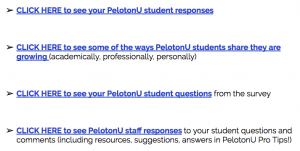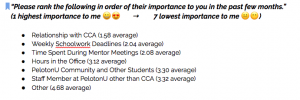Faster, farther, together. A peloton is a group of cyclists that rides close together to save energy. PelotonU exists for our students to journey faster and further to their goals and degrees together, with the support of our PelotonU community).
Student input and feedback on the program is an invaluable puzzle piece for us to work faster together, so we can go further. We seek student voices informally, including in conversations about upcoming events, office culture, and ideas on new resources/curriculum. We also involve students in the hiring process for new staff and invite students to share their experiences with others interested in PelotonU’s work (as well as folks creating similar programs elsewhere in the nation).
PelotonU’s ultimate success IS our students’ success, so there is no voice more important to listen to about what is working and what needs tweaking. Recently, 50 of our 74 enrolled students contributed feedback through an anonymous student survey, sharing thoughts on their ranked importance of various resources, highlighting ways they have grown, noting skills to continue developing, and other comments.
Data is Only Helpful as Action
I could never explain everything I learned from teaching, but one of the most influential mantras that has followed me (at least in my professional life) is that data is only helpful as action.

If we hear what our students are telling us but don’t act, we have not truly given them a voice. In sharing the results from our student survey back to our students, I wanted to show our students that we are not only listening, but responding… acting on the data.
Additionally, I am constantly thinking of how intentionality is one of the not-so-secret ingredients in the secret sauce of building cultures and relationships that place high a value on individuals and community (i.e. students).
Instead of simply showing students how they responded, I wanted to use their words, their voices, to help continue strengthening our PelotonU community:
1) We shared how students actually responded to the questions in the survey. The rankings are averaged and shown in order from students’ most important to least important resource as well as to the extent students agree with statements about PelotonU.

2) We included specific examples that students cited for how they are growing academically, professionally, and personally. In the vein of intentionality, the included student responses about growth are varied so that most students can find at least one that they can relate to, highlights student effort and growth (rather than absolute achievement), build a collective pride about our community, and illustrate that struggle is normal (we attempt to maximize every opportunity to normalize struggle/challenge!).
3) We shared the questions students asked, including the specific knowledge and skills that students wrote they wished that they had. Not only did it feel important that PelotonU staff responded to these with resources and recommendations, it felt like a rare opportunity to reveal what others’ wish they knew more about or where others wanted to build more competence. Here was another chance to normalize struggle… you are not the only student thinking, “I wish I was a better writer!” “I still struggle with public speaking.” “It’s hard to balance school with everything else in life.” “I wish I felt more confident!”
4) We responded to each student question and ensured that we had at least one resource recommendation aligned to the knowledge and skills students desired to develop. We consolidated these responses onto a “PelotonU Pro Tips” document previously created, assuming that directing students to one location for similar information is always better than adding more resources to remember. When possible, we also redirected or reminded students about previous resources that fit their questions.
After drafting this document, I asked a student for feedback before emailing to all students. After explaining the intentions we had, she gave some brilliant suggestions about how to make the data more visually digestible (including adding emojis) and make the overall document more user-friendly and navigable.
*Explore our student’s responses (and our responses to their responses!)
Moving Forward… Faster, Farther, Together
Why does this even matter? Perhapsthe easiest way to answer this question is to quote a student from the survey:
“What I have learned through this challenging period is that I am resilient and strong and must realign my priorities regularly, keeping my educational goals on that list.”
Although currently 45 million working adults in America have some college but no degree, 80% of PelotonU students are persisting in college and 90% are on-track to earn their degree on time – proving they are resilient and strong. PelotonU is fortunate to partner with other terrific folks working to launch similar models of hybrid college across the country to increase the numbers of working adults with degrees. We must constantly monitor our progress to supporting each student that we serve and realign ourselves as needed so that we keep our students’ educational goals always on the forefront of our minds. As we all strive to increase college options and access, inviting student voices to the table is critical for moving faster, farther, together.
Speaking of “Together…”
I’d love to learn from y’all what this might look like at other organizations! How do you ensure your students/clients are truly empowered? Share your best practices and/or lessons learned from your community/organization at holly@pelotonu.org!
